Eric Fischl Questions AmericaÔÇÖs Obsession With Dolls
The sacred and the abject have always danced around one another.┬áEric Fischl, who began painting in the ÔÇÿ70s,┬áhas moved with grace between the two, capturing the sterile beauty of the suburbs of his youth┬áÔÇö he grew up in Port┬áWashington,┬áNew York┬áÔÇö and the troubled people who inhabit them. Both his aesthetic and his subject matter, which he found through his own complicated relationship to his mother (an alcoholic who eventually committed suicide), allow for an uneasy kind of voyeurism that exposes the security of domesticity and reveals a deep isolation that no one can quite escape.┬áIn┬áSleepwalker, an early painting of his, a naked, adolescent boy with his knees slightly bowed and his back hunched stands with water up to his shins in a kiddie pool, jerking off. ┬áIn┬áBad Boy, which Fischl painted two years later, a grown woman sprawls on a bed as brilliant filaments of light trace the contours of her torso with the alternating slit shadows characteristic of Venetian blinds. She lies there as a boy leans against a dresser, staring at her and, behind his back,┬áslipping his hand into her purse.
Fischl worked with a mix of erudition, ennui, and humor that made his paintings, at first glance, accessible. They often trailed off, however, into unanswered questions or unresolved narratives. But in the years that followed his careerÔÇÖs success,┬áFischl has tried his hand at putting together exhibitions of other peopleÔÇÖs paintings, poems, and photographs. When Glenn Fuhrman, founder of the FLAG Art Foundation on 25th Street, approached Eric Fischl about curating a show, Fischl proposed ÔÇ£Disturbing Innocence,ÔÇØ a show with clear affinities to his own work and based on another broad question heÔÇÖd been turning over in his mind.┬áÔÇ£Why, in a country that is arguably the richest, most powerful, most technologically advanced in the world,ÔÇØ he wondered, ÔÇ£do we find so much of our artistic talent playing with dolls? Is it something about a profound ambivalence towards the future? A terror of the future that causes a regression? Is it about individual artists not really feeling like theyÔÇÖre connecting to a bigger public, so theyÔÇÖre basically left playing with themselves, which is the arena of dolls?ÔÇØ┬áSEEN spoke with Eric Fischl about several of the works he included in the resulting show,┬áÔÇØDisturbing Innocence,ÔÇØ which runs through January 31.
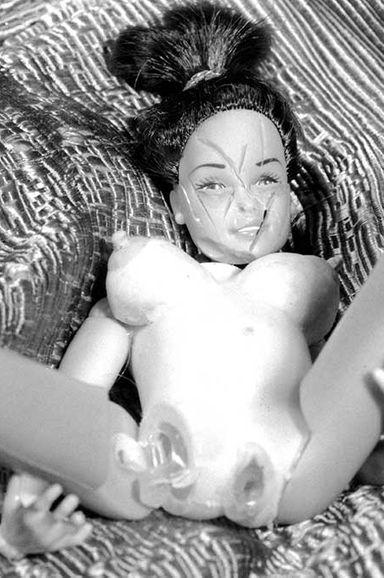
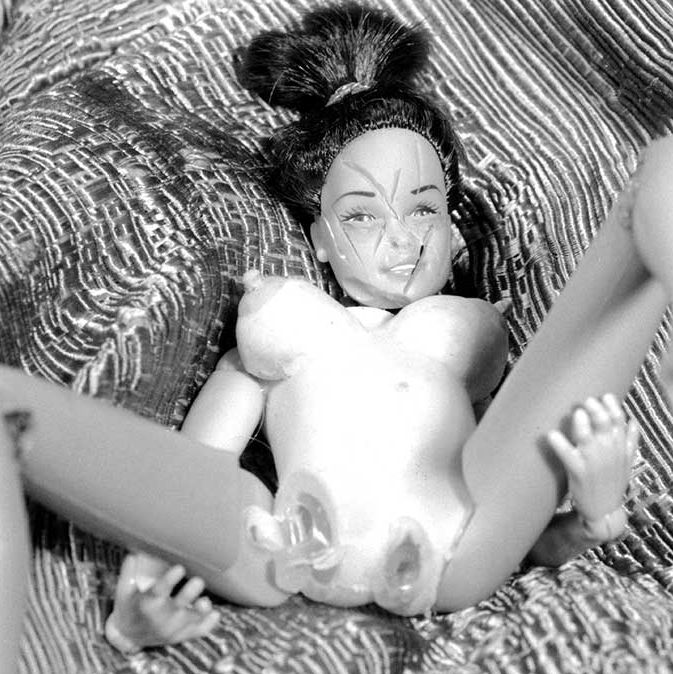
"There are two Cindy Sherman photographs of these dolls, one male and one female. The female is shredded. She's scarred, cut up, brutalized, sp...
"There are two Cindy Sherman photographs of these dolls, one male and one female. The female is shredded. She's scarred, cut up, brutalized, spread-legged, offering herself, but in a way that's so self-wounding."
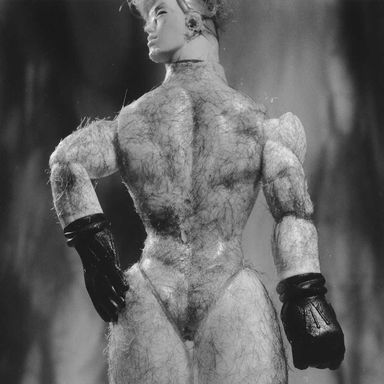
"The guy is this hideous oaf, this hirsute, overmuscled body and pretty-boy face ÔÇö it's a shocking indictment of maleness."
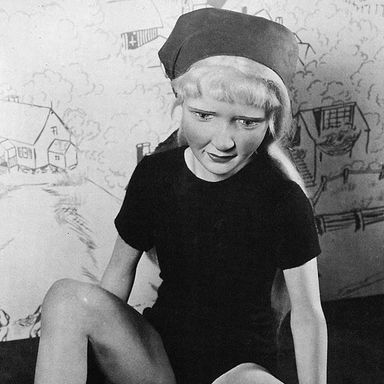

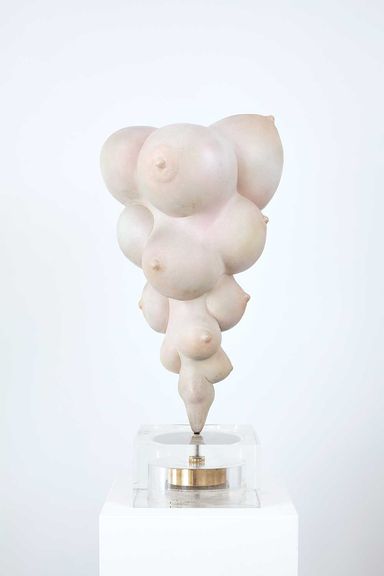
"It's almost like a plume of smoke, but there's a plume of breasts. As they go up, they get bigger and bigger and bigger, which is very much a ma...
"It's almost like a plume of smoke, but there's a plume of breasts. As they go up, they get bigger and bigger and bigger, which is very much a male thing ÔÇö you know, fantasy fetish humor."
Photo: ┬® Thomas Lannes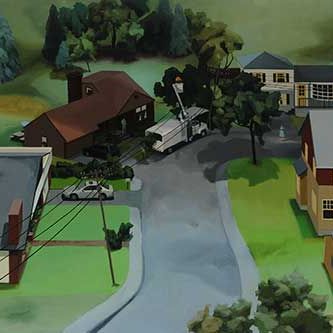
ÔÇ£The first thing you see are your stereotypical visions of a tranquil suburb.ÔÇØ
Photo: ┬® 2014 Gary Mamay for images only
ÔÇ£James CasebereÔÇÖs Landscape With Houses (Dutchess County) #9, 2011, is a daytime scene of a town, a New EnglandÔÇôy kind of town with a football field, ...
James Caseberes Landscape With Houses (Dutchess County) #9, 2011, is a daytime scene of a town, a New Englandy kind of town with a football field, and when you turn the corner 

 you see the nighttime view of it. You see that the town has caught fire. It loses its sense of security right away. You immediately lose that sense...
 you see the nighttime view of it. You see that the town has caught fire. It loses its sense of security right away. You immediately lose that sense of order and well-being.
"ThereÔÇÖs this George Condo painting of a couple in a violently powerful embrace. Their faces are all teeth ÔÇö big eyes and teeth. They are in a se...
"ThereÔÇÖs this George Condo painting of a couple in a violently powerful embrace. Their faces are all teeth ÔÇö big eyes and teeth. They are in a sexual position where both the male and the female seem equally avaricious in their sexual appetite and their physical need. They feel equally dangerous.ÔÇØ
ÔÇ£In the kind of crumbly nature of Brittle House, thereÔÇÖs something slightly off, thereÔÇÖs some undercurrent that's present, but not overt in a way that...
ÔÇ£In the kind of crumbly nature of Brittle House, thereÔÇÖs something slightly off, thereÔÇÖs some undercurrent that's present, but not overt in a way that you think about it. ItÔÇÖs a fantasy; sweet and childlike.ÔÇØ
ÔÇ£Is it a cast doll or is it a cast baby? It has that resonance of the bodies that they found in Pompeii, which had been buried and burned in the lava....
ÔÇ£Is it a cast doll or is it a cast baby? It has that resonance of the bodies that they found in Pompeii, which had been buried and burned in the lava. When they poured concrete into those holes, they came up with whole bodies that had been frozen into tragic positions and burned to ashes, leaving just the negative space there. This has that a similar quality of something that has been recaptured from a tragedy.ÔÇØ
"Let me say this about the exhibition: The way that the female artists use the dolls and toys and mannequins is fundamentally different from the ...
"Let me say this about the exhibition: The way that the female artists use the dolls and toys and mannequins is fundamentally different from the way the male artists do. The female artists are exploring, challenging, exploding stereotypes. When a woman mummifies a Barbie, that makes a pretty big statement, I think. In E.V. DayÔÇÖs mummifying of Barbie (putting her to ÔÇ£restÔÇØ), she creates a kind of jewelry display ÔÇö the silvers and golds, the shininess and preciousness of them ÔÇö which also take on the characteristics of sex toys.ÔÇØ
ÔÇ£Next to the Aura Rosenberg portrait, you have the Richard Prince re-photo of Garry Gross's photo of prepubescent Brooke Shields. And then there is th...
ÔÇ£Next to the Aura Rosenberg portrait, you have the Richard Prince re-photo of Garry Gross's photo of prepubescent Brooke Shields. And then there is this Inez van Lamsweerde & Vinoodh Matadin [photo,] Kirsten, Star. Each photo has its sense of turning a female ÔÇö a child ÔÇö into a doll, dehumanizing it. By conflating real children and dolls, these works challenge the ideas of objects of desire.ÔÇØ
"In the exhibition, this Sarah Lucas sculpture of a woman with like six breasts is juxtaposed with the Hans Bellmer. SheÔÇÖs resting her head and h...
"In the exhibition, this Sarah Lucas sculpture of a woman with like six breasts is juxtaposed with the Hans Bellmer. SheÔÇÖs resting her head and her arms on her bent legs, conveying a feeling of utter exhaustion. It seems to take on the weight of [male] expectations, as well as the responsibility of nurturing.ÔÇØ
Photo: 2014ÔÇ£On one of the most troubling walls in the exhibition, there's an Aura Rosenberg portrait of a young Lena Dunham being turned into a puppet. Dental fl...
ÔÇ£On one of the most troubling walls in the exhibition, there's an Aura Rosenberg portrait of a young Lena Dunham being turned into a puppet. Dental floss was used to create the separation of jaw from face in keeping with the ÔÇ£puppetÔÇØ effect. It is LenaÔÇÖs mother, Laurie Simmons, who is behind her, holding the floss, adding another dimension to this really intelligent and disturbing photograph.ÔÇØ
"It's Wonder Woman and Alice from Alice in Wonderland, and Alice is sort of trying to crawl back up inside Wonder Woman."




























![ÔÇ£Next to the Aura Rosenberg portrait, you have the Richard Prince re-photo of Garry Gross's photo of prepubescent Brooke Shields. And then there is this Inez van Lamsweerde & Vinoodh Matadin [photo,] Kirsten, Star. Each photo has its sense of turning a female ÔÇö a child ÔÇö into a doll, dehumanizing it. By conflating real children and dolls, these works challenge the ideas of objects of desire.ÔÇØ](https://pyxis.nymag.com/v1/imgs/abb/284/150f5ecc15f6010a27b0b75a19bce24ca1-08-distinno-18-inez.rsquare.w384.jpg)
![ÔÇ£Next to the Aura Rosenberg portrait, you have the Richard Prince re-photo of Garry Gross's photo of prepubescent Brooke Shields. And then there is this Inez van Lamsweerde & Vinoodh Matadin [photo,] Kirsten, Star. Each photo has its sense of turning a female ÔÇö a child ÔÇö into a doll, dehumanizing it. By conflating real children and dolls, these works challenge the ideas of objects of desire.ÔÇØ](https://pyxis.nymag.com/v1/imgs/abb/284/150f5ecc15f6010a27b0b75a19bce24ca1-08-distinno-18-inez.rdeep-vertical.w768.jpg)


!["In the exhibition, this Sarah Lucas sculpture of a woman with like six breasts is juxtaposed with the Hans Bellmer. SheÔÇÖs resting her head and her arms on her bent legs, conveying a feeling of utter exhaustion. It seems to take on the weight of [male] expectations, as well as the responsibility of nurturing.ÔÇØ](https://pyxis.nymag.com/v1/imgs/a8f/bed/5147ae543056ed4acae945b294b2bf679a-08-distinno-20-lucas.rdeep-vertical.w384.jpg)
!["In the exhibition, this Sarah Lucas sculpture of a woman with like six breasts is juxtaposed with the Hans Bellmer. SheÔÇÖs resting her head and her arms on her bent legs, conveying a feeling of utter exhaustion. It seems to take on the weight of [male] expectations, as well as the responsibility of nurturing.ÔÇØ](https://pyxis.nymag.com/v1/imgs/a8f/bed/5147ae543056ed4acae945b294b2bf679a-08-distinno-20-lucas.rdeep-vertical.w768.jpg)

























